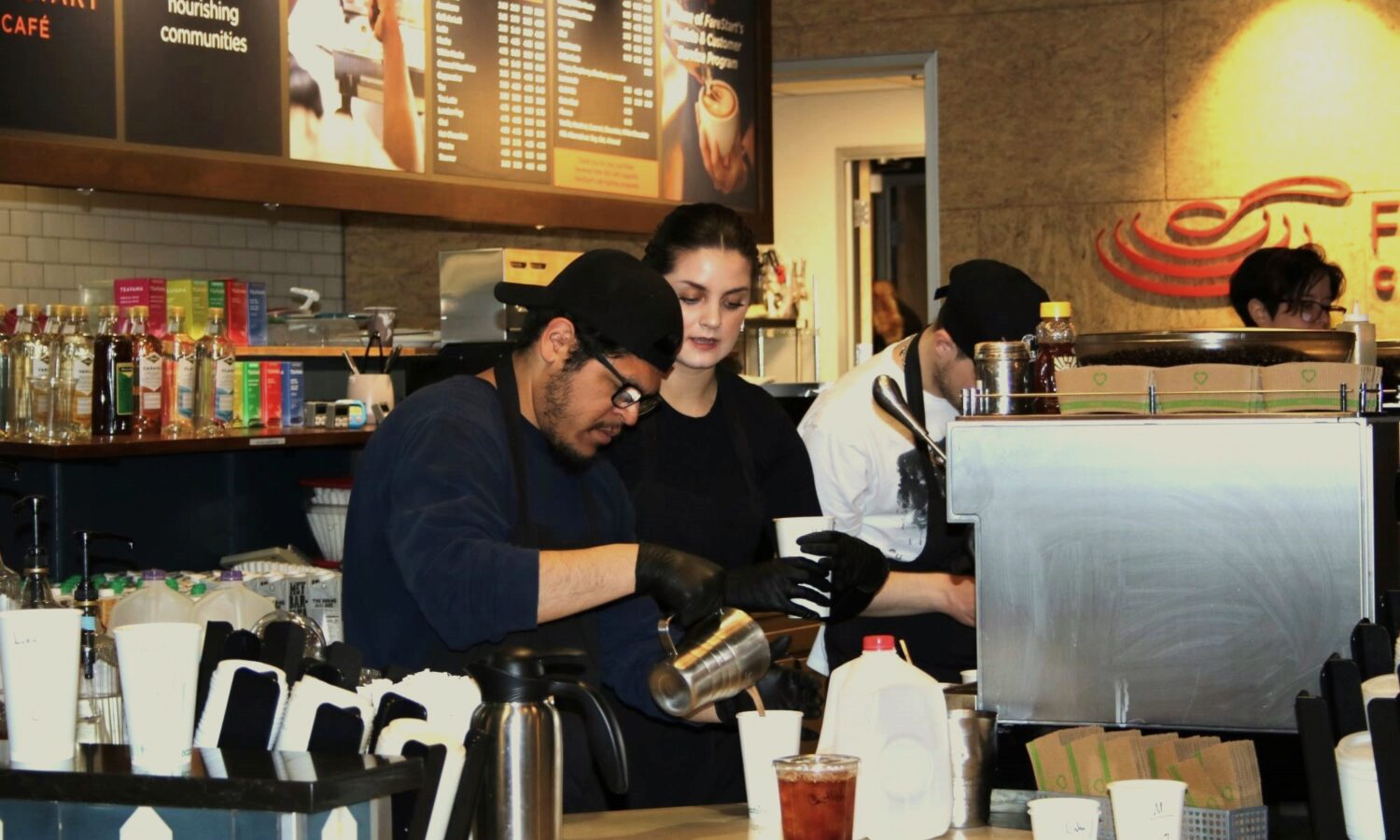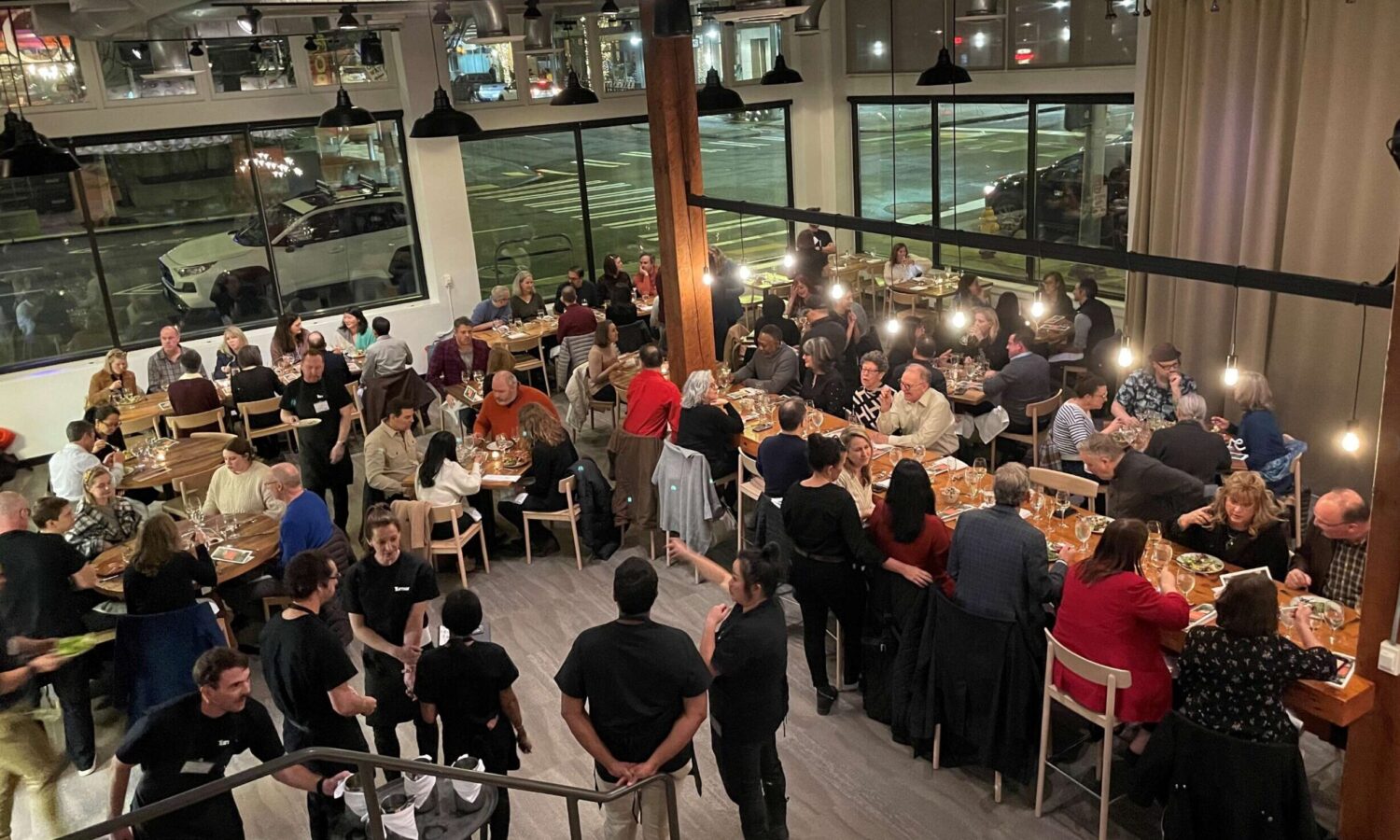 Chef Wayne Johnson (he/him) is retiring at the end of the year after a high profile and extremely successful career in the culinary industry. But despite his many professional accomplishments, the thing that makes him the proudest is the community that he’s helped build. A community of fellow chefs, students, farmers, instructors and staff all learning from one another and united by a love of food and a desire to use it to make the world a better place.
Chef Wayne Johnson (he/him) is retiring at the end of the year after a high profile and extremely successful career in the culinary industry. But despite his many professional accomplishments, the thing that makes him the proudest is the community that he’s helped build. A community of fellow chefs, students, farmers, instructors and staff all learning from one another and united by a love of food and a desire to use it to make the world a better place.
Chef Wayne doesn’t get hung up on titles and he thrives on moving forward, both personally and professionally. Shortly after he moved to Seattle in 1999 to be Executive Chef at Andaluca in the Mayflower Park Hotel, he began helping out in the FareStart kitchen on his days off because, as he says, “It was just an open place where people came together collectively and helped each other get better. And I needed help to get better.”
As Chef Wayne’s reputation and credentials in the community grew, he stayed humbly true to this desire to grow and to give back. He went on to become Executive Chef at Ray’s Boathouse and opened Shuga Jazz Bistro in Renton while regularly volunteering and hosting Guest Chef Nights at FareStart. When he accepted the Executive Chef role at FareStart in 2015, Chef Wayne fully committed himself to taking the next step in contributing to FareStart’s mission.
Chef Wayne explained his career trajectory this way: “We learn from others, whether it’s youth, whether it’s older folks, whatever. If we’re open to being better ourselves, we’re going to learn from people. So I really was not trying to stay in a position for 20 years and call it my career. It was always like, what’s next?”
Creating a Positive Learning Culture in the Kitchens
As FareStart expanded its social enterprise businesses to include multiple restaurants and a large catering operation, Chef Wayne’s role expanded to Vice President of Culinary Operations. FareStart was dedicated to making its kitchens world-class, but in the process, there was work to be done to navigate some of the tensions between a student-centered training organization and the traditional, demanding restaurant culture.
“We had to work together to rebuild that culture in the kitchen to match where FareStart was as a training and mentoring organization, so that not just the students would be able to go out and get jobs, but also the trainers and the chefs within the kitchens could grow their skills as well. I didn’t come up through a lot of feel-good kitchens, so to be a part of that training and mentoring culture, and to have people leave here to create that in other kitchens, that felt like we were doing our little, small part in Seattle.”
The goal for Chef Wayne was to leave things open enough in the kitchen that every person could shine in their own way. “It’s amazing what people can do if you just give them a sheet of paper and say ‘Get creative.’ If you have each person working their own thing, it’s doing their greatness. Cooks need to have room to make mistakes, talk about and learn from them. When you do that, you start to grow and that becomes a culture of acceptance and togetherness.”
Bringing the Community Into the Conversation
 When COVID hit and FareStart’s retail businesses closed, the mentality of culinary world-class training had to be shelved. “We were so focused on putting out food and feeding the community, we lost the connection that came from working side by side with our students and our larger mission. There weren’t pathways forward, so the culture of teaching and lifting everybody up was sidelined.”
When COVID hit and FareStart’s retail businesses closed, the mentality of culinary world-class training had to be shelved. “We were so focused on putting out food and feeding the community, we lost the connection that came from working side by side with our students and our larger mission. There weren’t pathways forward, so the culture of teaching and lifting everybody up was sidelined.”
The demands of producing millions of meals to feed the community while keeping staff safe weighed heavily on Chef Wayne, and it revealed some deep fissions within FareStart leadership and the people working on the ground. With tensions amplified by the global social justice movement, Chef Wayne helped FareStart lean into the issues by holding regular Black, Indigenous, People of Color (BIPOC) table talks to allow people to speak openly about their grievances. “It was a safe space where people could get raw and leave it on the table.”
This body of work helped inform FareStart’s approach to people and inclusion and led to the formation of various affinity groups to provide a voice for FareStart staff to be seen and heard. Voices from the affinity groups are assimilated through facilitators to an Equity Council which in turn brings the conversation to leadership. “We’re doing this work together,” says Chef Wayne. “We acknowledge that we hear you and we’re working together to make things happen. There’s a dialogue and there’s trust.”
Lifting People Up
 In 2021, Chef Wayne stepped back from kitchen operations and focused his work more broadly in the community, assuming the role of Senior Advisor for Culinary and Community Engagement. Since then, he has dedicated himself to fostering food equity in the community by building stronger relationships with culinary and farm partners in the region. Chef Wayne has sought to lift the voices of BIPOC farmers and help them create viable pathways forward: “We can’t just take the easy road and lean on people that already have everything. If we’re going to lift up a community, we have to do the hard work too.”
In 2021, Chef Wayne stepped back from kitchen operations and focused his work more broadly in the community, assuming the role of Senior Advisor for Culinary and Community Engagement. Since then, he has dedicated himself to fostering food equity in the community by building stronger relationships with culinary and farm partners in the region. Chef Wayne has sought to lift the voices of BIPOC farmers and help them create viable pathways forward: “We can’t just take the easy road and lean on people that already have everything. If we’re going to lift up a community, we have to do the hard work too.”
Now, as FareStart navigates its way in today’s new culinary landscape, Chef Wayne is looking forward to the next generation of leaders. “You need people growing. That’s the whole point. You want people who are going to push you to that next level because you can’t move out of it if you’re too busy in it.”
After volunteering and working at FareStart for the past 24 years, Chef Wayne’s approach to mentoring and training has left an indelible mark on the people, culture and practices of our organization. While he’s ready to make the next step in his own personal journey, Chef Wayne knows he will miss the people and the passion of FareStart. “People come here for the mission, to support the mission, and they become transformed. Their lives are transformed. I think it’s cool to watch that. That’s the power of FareStart, because it’s not just about students’ lives being transformed, but everybody that comes in — donors, staff, students, delivery people — they walk in for a minute and have the conversation and are never the same.”


